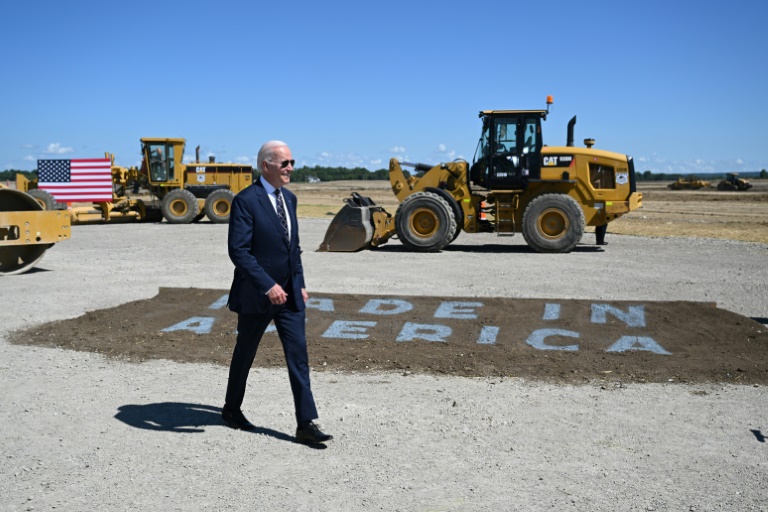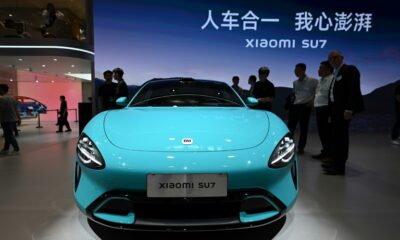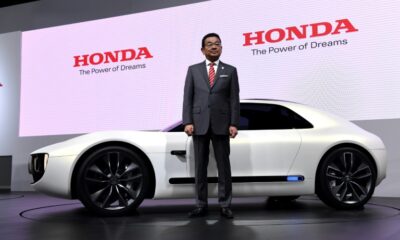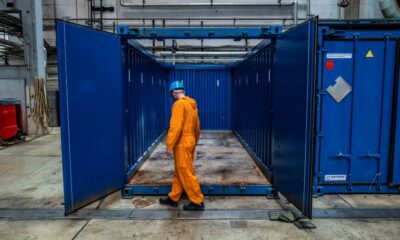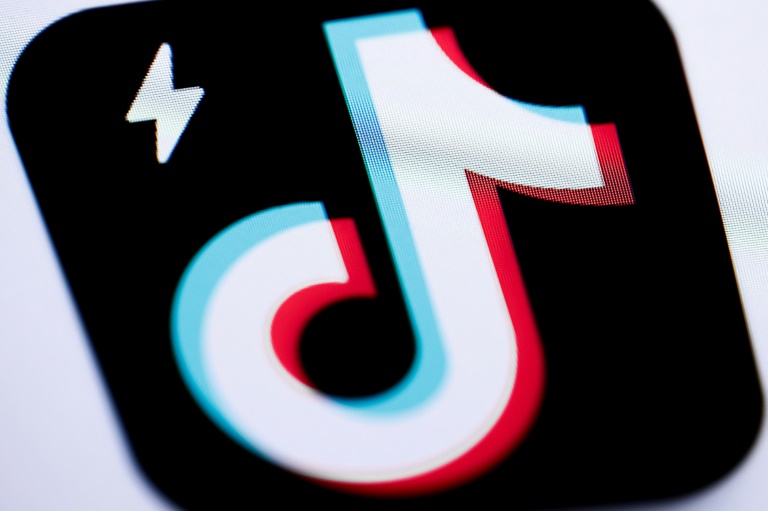Fresh off of recent legislative triumphs aimed at supporting US manufacturing, President Joe Biden is set for an upbeat appearance Wednesday at the first Detroit Auto Show since the pandemic.
After months of inaction in Congress, Biden capped the summer by signing into law major new investments in semiconductor production and combatting climate change, lending the US president’s Democratic Party some momentum heading into the November midterm elections.
But not far below the celebratory surface, the auto industry is grumbling over a change in the consumer EV tax credit policy that industry officials warn could slow the transition to emission-free vehicles.
At issue are sourcing requirements in the recently passed Inflation Reduction Act meant to prod automakers into using EV batteries produced in North America as well as critical materials sourced from North America or countries with which the United States has a free trade agreement.
The restrictions come as Washington seeks to wean its economic dependence on Russia and China, and as pandemic-induced shortages underscored the vulnerability of having far-flung supply chains.
But auto industry officials and EV experts worry the measure — which affects a consumer tax credit of up to $7,500 on EVs — will slow their adoption in the United States.
“You’re going to see a stalling in the rate of growth,” said John Eichberger, executive director of the Fuels Institute, a nonprofit research group which is funded by a range of energy and transportation companies but does not engage in policy advocacy.
– ‘Missed opportunity’ –
A self-professed “car guy,” Biden has made previous presidential visits to tour General Motors and Ford plants in Michigan — a key electoral swing state.
Biden’s appearance Wednesday at the Detroit Auto Show lends some shine to the revived event following a three-year pandemic hiatus.
Since the last show in 2019, Detroit’s “Big 3” — GM, Ford and Chrysler (now called Stellantis) — have announced tens of billions of dollars in EV investment and unveiled numerous new offerings.
Last Thursday, GM unveiled the Equinox EV, a model with a starting price of $30,000, less than half the average price of EVs now available in the market.
On the same day, Stellantis brand Jeep showed images of two new electric SUVs and confirmed that its all-electric SUV for Europe would launch in 2023.
The arrival of EV versions of popular models like the Ford F-150 has meant that EV sales in the United States surged more than 66 percent in the second quarter compared with the period a year ago, according to Cox Automotive.
EVs comprised 5.6 percent of the total US market, according to Cox.
Still, a meaningful transition to EVs from the internal combustion engine faces several challenges, including shortfalls of lithium and other key battery materials and doubts over consumer demand, in part because of lofty price tags — something the $7,500 tax credit aims to combat.
The Alliance for Automotive Innovation, a Washington trade group representing big automakers, highlighted fine print around the tax credit that it said would derail EV growth.
One of those is the requirement that automakers gradually increase minimum levels for choice materials through 2026.
The alliance praised tax credits in the bill for EV manufacturing plants, but said they were offset by the consumer provisions.
– ‘A bumpy road’ –
“Unfortunately, the EV tax credit requirements will make most vehicles immediately ineligible for the incentive,” said John Bozzella, president of the lobby group.
“That’s a missed opportunity at a crucial time and a change that will surprise and disappoint customers in the market for a new vehicle,” he added.
Alan Amici, chief executive of the Center for Automotive Research in Ann Arbor, Michigan, said the industry sees economic benefits to sourcing locally in light of the issues that surfaced during the pandemic.
But it takes time to adjust supply chains, he said.
“The industry needs to figure that out,” said Amici, adding that companies are studying the measure and hoped Washington officials might show flexibility in implementing the policy.
Eichberger cited analysis showing that, in certain years, only a few EV models would qualify for the credit under the standard.
He warned that a leveling off or decline in EV sales in the next couple of years could kill momentum for a transition that remains at an early stage.
“It’s going to be a bumpy road, and this is another bump,” Eichberger said.

 Business5 months ago
Business5 months ago
 Business4 months ago
Business4 months ago
 People4 months ago
People4 months ago
 Events6 months ago
Events6 months ago
 Events3 months ago
Events3 months ago
